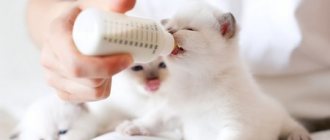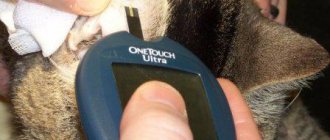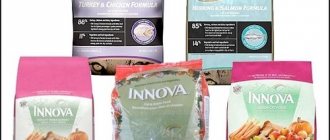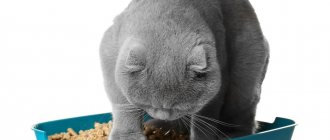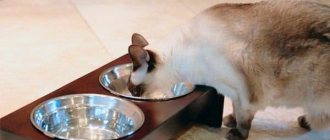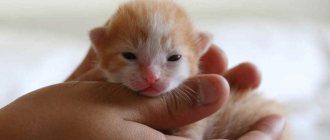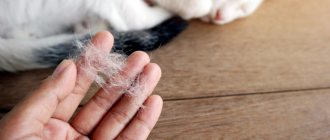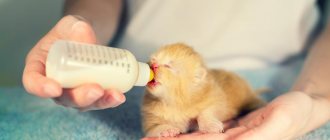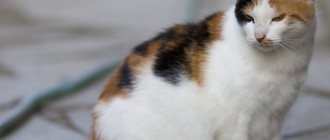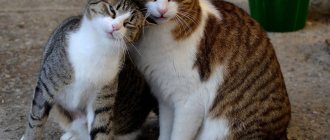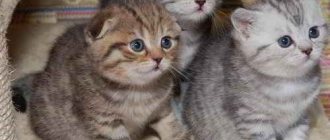Increasingly, cat lovers are choosing representatives of the Scottish breed. Such cats have a calm character and become a good friend to the family. But before you get a new pet, you should learn the rules of caring for it. Many people mistakenly assume that caring for a Scottish cat will be no different from caring for a regular cat. But purebred cats have their own nuances in care and nutrition, and if they are not followed, the pet may experience serious health problems. Therefore, when choosing food, it is better to give preference to high-quality food, where manufacturers have balanced all the necessary nutrients and vitamins required by a representative of this breed.
Who are Scottish cats?
The Scottish cat breed is divided into two types: fold-eared cats and straight-eared cats. Fold-eared representatives are also called Scottish Fold, and straight-eared representatives are also called Scottish Straight. In turn, each of these types can be long-haired or short-haired. As a result, it turns out that Scottish cats have four varieties, which differ in color, shape and eye color.
If we talk about the history of the origin of this breed, many sources say that these cats began to originate from the Scottish cat Susie. This is where the widespread distribution of representatives of this breed began. But there is still an opinion that such cats existed before, they just did not attract the attention of breeders.
If we talk about the appearance of such pets, they have a body of medium size and length. An adult representative of the breed weighs about 3.5 kg. They have a small nose and large, wide-set eyes. To many, the Scottish cat's gaze resembles that of an owl and seems quite cute. Scottish Folds have small, curled ears. In long-haired Folds, the fur makes the ears almost invisible. Representatives of the Scottish Straight have erect ears with sharp tips.
The character of cats of this breed is very willful. They are quite sociable and love outdoor games. Scottish Folds and Scottish Straights get along easily with other pets, but they still show jealousy and require more attention from the owner.
Rules of care
In general, such pets are distinguished by good health. But there are still cases when they develop genetic diseases. Therefore, before purchasing, it is better to find out from the breeder about the diseases of the parents of the pet you are purchasing. But besides this, the pet’s fur, ears and eyes require constant and proper care. And it is better to constantly visit the veterinarian to avoid unpleasant consequences.
Grooming will not cause problems. To do this, you just need to comb the cat with a special brush. Representatives of the Scottish breed begin to shed in the spring, but if shedding occurs throughout the year, it is better to seek advice from a specialist. This problem can arise due to poor nutrition, skin disease, or inappropriate temperature conditions in the apartment. Scots don't need frequent bathing. If your pet gets dirty, you can wash only this area or remove the dirt with a napkin. Kittens and older cats should not be washed.
Ear cleaning should be done once every couple of months. To do this, use a clean, damp cotton swab. With its help, sulfur and dust are removed. You should also treat your eyes with a cotton swab. The eyes of Scots are quite sensitive, so if they start to “flow”, instilling tea or chamomile decoction is allowed.
In addition, you need to periodically trim your pet's claws. The procedure should be carried out once every two weeks. In this case, you must be careful and cut off only the white part of the claw. The pink part contains blood vessels and nerve endings.
Nutrition for illnesses
If we compare the Scottish Fold with the Straight-eared, it turns out that the Scottish Fold is more susceptible to disease. The mutation gene that makes the ears so charming is to blame for this.
Most often, Scottish cats suffer from allergies, arthrosis and urolithiasis. For all diseases, only a veterinarian can prescribe adequate treatment and preventive measures. Don't even think about self-medication! In some cases, a special therapeutic diet may help, which should also be prescribed by a veterinarian.
What food to feed a Scottish cat on a therapeutic diet:
- Hill's Prescription Diet s/d – for the treatment of urolithiasis;
- ROYAL CANIN Skin Young Male – for cats with sensitive skin;
- Hill's Prescription Diet z/d – for the treatment of food allergies;
- Hill's Prescription Diet Metabolic + Urinary – obesity, prevention of urolithiasis;
- Hill's Prescription Diet j/d – treatment of joint diseases.
Feeding inoculation
For the first month of its life, a kitten feeds on its mother's milk, so it receives all the necessary minerals and vitamins that are necessary for proper development. But there are times when mother's milk is not enough, in which case you can feed with cow's milk or a special formula. As early as a month, you can gradually introduce meat, fish or cottage cheese. If the owner plans to feed the baby with store-bought food, then the norm indicated by the manufacturer should be followed.
So, the diet of Scottish Folds should include meat, fish, cereals, vegetables and dairy products. If we talk about meat, then beef or poultry is suitable here. Pork or lamb, due to their fat content, will have a bad effect on the digestive system of the Scots. The meat should be boiled, but occasionally it is allowed to serve it raw, but before that it must be treated with boiling water. The fish must be from the sea, and it can only be given boiled. Before this, all bones must be removed so that the pet does not choke. From cereals you can give rice or oatmeal, you can also add a boiled egg there. Many Scottish Folds are not averse to eating vegetables. This will be an additional source of nutrients. You can also grow special herbs at home. If we talk about dairy products, they should only be given to kittens. Adult cats do not digest lactose well.
If the owner decides to give the cat only homemade food, then he should additionally buy vitamins. They can be purchased at any veterinary pharmacy. If the animal eats specialized food, then it does not need additional vitamins.
What types of food are there?
First of all, cat food can be divided into three groups according to the type of production. The first group includes dry food. This product resembles crackers. They are quite easy to feed your pet, but you need to have a large amount of water. It is suitable for daily nutrition, and it will also help remove plaque from your cat’s teeth. Dry food from trusted manufacturers contains all the necessary vitamins and minerals. In addition, such food can be left in a bowl for a long time without fear that the food will become unsuitable for eating.
Wet food is a cross between canned food and dry food. Pieces of this food are impregnated with a special sauce. Typically, such a product is produced in portions.
Well, the third type is canned food. It is made from natural raw materials and packaged in sealed jars. Canned food can be stored for a long time before opening, but after opening it is recommended to consume it as soon as possible. Also, after opening, the remaining product should be placed in glass containers to avoid oxidation.
In addition, cat food is divided into classes. The budget option includes economy class products. These foods are made from soy protein, animal by-products and grains. They come in a variety of flavors, such as fish, poultry or beef. This is obtained by adding dyes and flavors. But there is very little natural protein in such foods.
The next class is middle. Such foods are made from higher quality by-products and will not contain flavorings or dyes. Such foods differ not only in taste, but can also have a special purpose, for example, to promote wool removal.
Third class – premium products. Here, manufacturers use only natural and high-quality raw materials, and no by-products are added here. The content of cereal fillers is minimized or completely absent. Also, such food is additionally enriched with various vitamins and minerals, so the pet will not need additional supplements. Premium food differs not only by age category, but there are also foods developed for a special breed of cat. At the same time, manufacturers pay attention not only to the necessary components for a particular breed, but even form special granules, taking into account the anatomical characteristics of each breed.
The fourth class is holistic or super premium class. Feeds of this class are made not just from natural products, but from products that have passed the certification process. Such a product may contain raw meat of various varieties, vegetables, and a complex of vitamins and minerals. In most cases, such feed is transported and stored frozen.
How to choose good food
When entering a pet store, the buyer is faced with shelves with a variety of food from various manufacturers. They all have attractive packaging, but differ in price. An ignorant person will easily get confused in the choice. Therefore, to begin with, it is better to decide on the class of food. Economy or middle class products are not suitable for Scottish folds and Scottish straights. From them, cats will develop diseases of the digestive or urinary system. Therefore, it is better to take holistic or premium food. Typically, breeders make recommendations for a specific brand of food.
But still, buyers often note that many manufacturers' product quality decreases over time. Therefore, it is better to carefully study the composition. A high-quality food will have meat in the first place. If instead of “meat” it says corn or meat flour or rice, then it is better not to buy such a product. After this, you need to look at the amount of vitamins and minerals in a particular product. This parameter should be controlled depending on the characteristics of the animal and the presence of diseases.
If the pet is sterilized or neutered, then manufacturers here produce special food. Their distinctive feature is lower calorie content and more fiber in the composition. This is due to the fact that such animals become less active, but the use of regular food is also allowed, but its quantity should be reduced. Otherwise, the pet will suffer from excess weight. You should also pay more attention to such animals and try to attract them to active pastime.
Artificial feeding of a newborn kitten
Usually babies up to 1-3 months are fed by a mother cat. There are situations when the offspring is left without a mother, and a person takes on the role of nurse. This is a very important mission, which sometimes seems impossible. Nothing is impossible, the main thing is desire and skill. The best option is to ask your friends if they have a nursing cat. Usually the mother does not refuse to feed her foundlings.
If this option is not available, start feeding from a pipette. Before feeding, babies are weighed, this allows you to determine the required amount of food. A 100-gram baby will need 30 ml of formula or milk, which is how kittens are fed during the first week after birth.
Starting from the second week, the nutritional intake is increased. For every 100 g of baby's weight, at least 38 g of liquid food is needed. In the third week, at least 48 g is already required. Starting from the next month, the norm increases to 53 g.
During the first month, the baby should receive food multiple times (up to 10 times a day). For feeding, warm milk or cream is used, which is poured into the baby’s mouth using a pipette or syringe without a needle. This must be done carefully so that the kitten does not choke.
Cow's milk is slightly different in composition from cat's milk. For example, there is less water in cat milk (70%) than in cow milk (88%), and the fat content is higher - 11% and 3.25%, respectively. But the most important difference is the amount of lactose. There is almost 2 times more of it in cow milk (5.2%) than in cat milk (3%).
The pet store sells a special formula for newborn kittens, which is similar in composition to a cat's mother's milk and is more suitable for feeding babies than cow's milk.
The best dry food for Scottish cats
Pro Plan Delicate OPTIDigest Turkey Flavor
This food is suitable for adult animals aged 1 to 6 years with digestive problems. In this product, the manufacturer has created the optimal combination of all the necessary beneficial additives. There are vitamins such as A, D3, C, E. As well as iron, iodine, copper, manganese and selenium. To ensure your pet’s kidneys work optimally, the manufacturer has added the Optirenal formula. This component combines antioxidants, oxidizing agents and omega acids.
Even the most capricious representatives of the Scottish breed will like this food, since it contains high-quality turkey. Also, in the production of “Pro Plan Delicate OPTIDigest”, the best products containing protein were selected, thanks to which the pet will not develop allergies.
The daily amount for a particular cat will depend on its weight. So for pets weighing up to 4 kg, 60 grams of food per day will be enough; if the cat weighs from 6 to 8 kg, then the amount of product can reach up to 120 grams per day. In this case, you should take into account not only the weight of the animal, but also its lifestyle.
"Pro Plan Delicate OPTIDigest" is available in packages from 200 grams to 12 kilograms.
The average cost of a package weighing 200 grams is 154 rubles.
Pro Plan Delicate OPTIDigest Turkey Flavor
Advantages:
- Optimal granule size;
- Does not cause allergies;
- Improves digestion;
- Affordable price;
- Positive customer reviews.
Flaws:
- Not detected.
Brit Premium Cat Sensitive
This product from the Czech brand “Brit” is very popular among cat owners. It is suitable for cats of any breed, and since it is designed for animals with digestive problems, it will not cause an allergic reaction.
It is worth noting that the manufacturer has updated this product line. Now the content of meat and animal fat has been increased. In addition to essential minerals and vitamins, it also contains prebiotics, herbal and fruit extracts, as well as yeast. This will help improve digestion and increase the animal's immunity. It contains vitamin E and organic selenium; these components will slow down the aging process and allow your pet to enjoy life longer. It is worth noting that the product does not contain wheat, which can cause allergies in many cats.
"Brit Premium Cat Sensitive" can be given dry or soaked. On each package there is a table with the daily norm for a certain weight of the animal. This food comes in a bag. The weight of the product varies from 0.3 kg to 8 kg.
The average cost of a package weighing 300 grams is 250 rubles.
Brit Premium Cat Sensitive
Advantages:
- Does not cause allergies;
- Improves wool quality;
- Contains prebiotics;
- Increased amount of meat.
Flaws:
- Large granules.
Farmina N&D with chicken and pomegranate for sterilized cats
When creating food, research on the nutrition of carnivorous animals is used. Therefore, the amount of animal protein has been increased here, now in one package it is about 90% of the total mass.
Since sterilized animals become less active, Farmina N&D has a low glycemic index, for this reason the product will gradually release energy throughout the day. Therefore, the animal will not feel hungry for a long time.
Farmina N&D for sterilized cats contains all the necessary vitamins and minerals. The manufacturer also added antioxidants, aloe, rosemary and green tea extracts.
"Farmina N&D for sterilized cats" is suitable for individuals aged 1 to 6 years. The food is available in weights from 0.3 to 10 kg.
The average cost of a package weighing 300 grams is 385 rubles.
Farmina N&D with chicken and pomegranate for sterilized cats
Advantages:
- Good composition;
- Positive customer reviews;
- There is no unpleasant odor;
- The composition contains antioxidants and plant extracts.
Flaws:
- High price.
Eye treatment
Not only Scots, but also representatives of any breed, at such a young age need sensitive care and care from their caring owners. Just like the ears, the eyes need regular examination and treatment. A disinfectant solution applied to a cotton pad will help prevent infection from entering the eye mucosa and the development of an inflammatory process.
Owners should know that if a cat constantly tries to scratch its eye with its paw, shakes its head, and its visual organs are tearing or festering, it is urgent to contact a specialist. There may be a foreign body in the eyes of a kitten or an adult animal. The cause of such symptoms can also be an infectious disease such as conjunctivitis, keratitis, blepharitis, and so on. All these pathological conditions require long-term and high-quality treatment.
The best wet food for Scottish cats
Purina Pro Plan Nutrisavour Housecat
This wet food will be the best option for Scottish Folds and Scottish Straights, since it is intended for cats that live indoors. "Purina Pro Plan Nutrisavour Housecat" contains a large amount of protein, thanks to which the pet will maintain normal body weight. The fiber content is also increased here, thanks to this hairballs will not accumulate in the stomach. To improve the animal’s digestion, the manufacturer included prebiotics in the product; this will also reduce the unpleasant odor from the litter box.
"Purina Pro Plan Nutrisavour Housecat" is available in a pouch package. Once opened, the package can be stored in the refrigerator for 24 hours.
The average cost is 60 rubles.
Purina Pro Plan Nutrisavour Housecat
Advantages:
- Improves digestion;
- High content of protein products;
- Convenient packaging;
- Affordable price.
Flaws:
- Not detected.
Monge Monoprotein chicken flavor
This product is canned meat flakes. Monge Monoprotein is a mono-protein food because it contains only one source of animal protein. Thanks to this, your pet cannot develop an allergy to such food.
It should not be ignored that Monge Monoprotein is rich in nutrients and vitamins, and also contains taurine. But this product does not contain dyes, flavors, GMOs or other harmful additives. Thanks to this, it becomes possible not only to improve the health of the little friend, but also to extend his life. Since chicken meat is easily digestible, the cat will not have digestive problems.
One can contains 80 grams of food. It is recommended to give about 2-2.5 cans per day. But you should take into account the lifestyle, weight and age of the animal.
The average cost is 130 rubles.
Monge Monoprotein chicken flavor
Advantages:
- Made from fresh meat;
- Helps improve digestion;
- Rich in vitamins;
- Does not contain harmful additives.
Flaws:
- High price.
GO! Carnivore with salmon and cod
All products of the brand “GO!” belongs to the super-premium class. Therefore, such canned food contains only the best ingredients, and the manufacturer does not add flavors, dyes or other harmful additives.
The main components of the food are, of course, cod and salmon, and the manufacturer used vegetable broth to create moisture. Due to this, the product has optimal taste characteristics that attract the animal. Also “GO! Carnivore is rich in essential minerals and vitamins. To support optimal heart function and visual acuity, the manufacturer has added taurine. The presence of Yucca schidigera extract should not be ignored. Thanks to this, less unpleasant odor will come from the tray.
The average cost is 150 rubles.
GO! Carnivore with salmon and cod
Advantages:
- Compound;
- Contains essential vitamins and minerals;
- No harmful additives;
- Products are controlled at every stage of production.
Flaws:
- High price.
Hill's Prescription Diet for Kidney Problems
If an animal has a disease of its renal system, such food will help speed up the recovery process and prolong the life of the animal. A distinctive feature of Hill's Prescription Diet is the reduced amount of sodium and phosphorus, which will reduce the load on the renal system. And to improve blood flow in the kidneys, the manufacturer added Omega-3 fatty acids. A large amount of antioxidants will help neutralize the effects of free radicals. These components will also be useful in concentrating attention and increasing activity.
Hill's Prescription Diet is available in an 85 gram pouch. The manufacturer recommends introducing this food gradually.
The average cost is 90 rubles.
Hill's Prescription Diet for Kidney Problems
Advantages:
- Improves blood flow in the kidneys;
- Contains a large amount of antioxidants;
- Affordable price;
- Verified manufacturer.
Flaws:
- May cause diarrhea.
Natural nutrition for Scottish fold or straight-eared kittens and adult animals
This type of feeding is not easy and requires a certain amount of time to prepare food, which is not always convenient or possible.
List of main products that are allowed for Scottish cats:
- Frozen raw beef
(babies from 3-4 months can be given 30 grams per day). - Boiled chicken meat (breast).
- Boiled liver
, but not more than once a week. Otherwise, overuse of this product may lead to stomach upset. - Contrary to existing opinions that fish
, it is not recommended to give it to a Scot; in some exceptions, once a week, low-fat varieties, but in boiled form:
perch, hake or carp
. An excess of this product can lead to kidney disease, since fish belongs to the category of quickly digestible proteins. - Several times a week, low-fat kefir or cottage cheese, fermented baked milk and sour cream
are a real delicacy for the Scots. - Boiled chicken yolk
. - boiled milk and porridge
in the diet of Scots only
for up to 5 months
, otherwise they will cause stomach upset. - Cereals and vegetables
are carbohydrates that are simply necessary for the vital energy of your furry pet. Cereals such as semolina, buckwheat, oatmeal and rice can be mixed with meat or fish and given several times a week. - Boiled or steamed vegetables
: cauliflower, carrots, green beans are pureed and mixed with meat.
Fermented milk products should not be combined with porridge, meat or vegetables, otherwise they will be poorly digested. They can only be combined with eggs and bran.
The main percentage of products when feeding a Scottish cat naturally should be meat products, because they contain protein, which is necessary for the normal functioning of the body: heart muscle, good vision, reproduction, etc.
Microelements, vitamins and supplements
Dietary supplements must be included in the pet’s diet throughout the entire period of feeding natural products. Kittens under 6 months of age need a source of vitamins D and A, that is, fish oil. In addition, chain veterinary pharmacies offer a huge selection of multivitamin preparations for cats and kittens of the Scottish breed and simply as a species of animal.
Your pet must always have fresh, clean water. Ideally, you need to change the water 2 times a day. You can allow your pet to drink water from the tap; the Scottish breed especially loves this.
Approximate nutrition menu for 1 kg of body weight of a Scottish fold or straight-eared cat
Recipe 1:
- lean fresh beef (pour boiling water) – 25 gr.;
- light – 5 g;
- clean water – 10 g;
- vegetable oil – 2 g;
- dry ordinary tremors - 0.2 g;
- plain oat flakes – 4 gr.
Recipe 2:
- fresh liver – 10 g;
- lean fish – 25 gr.;
- buckwheat – 4 gr.;
- plain water – 7 g;
- regular dry yeast – 0.1 g;
- low-fat cottage cheese – 3 gr.
Once you've made the recipe, you can portion it out and freeze it for later. So at any time, after defrosting, you can quickly feed your pet natural food.
Prohibited foods for Scottish Fold and Straight-eared cats:
- pork, smoked, salted, peppered, dried, fresh meat;
- fats;
- floury, sweet.
